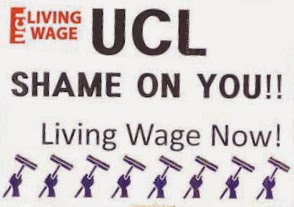“Living wage tied to better mental health in London”, the UCL website proclaimed on 10 October.
This conclusion, drawn from a recent study of the effect of the London Living Wage (LLW), should come as no surprise to supporters of the £8.55 hourly wage, but recent comments by new UCL Provost Michael Arthur – whose welcome speech took place the day before – suggest that the senior management should listen more to what the experts at their own university are saying.
The findings of the study, that employees have better mental health “when employers set a higher minimum wage based on realistic living expenses,” were followed by supporting comments from top UCL academics. Mel Bartly, a professor of public health at UCL, told Reuters that "children of economically stressed parents often struggle at school and suffer long into their adulthood," and that "there is no net benefit to society as a whole of having groups who are in poverty." These unequivocal conclusions in favour of the living wage were, however, not sentiments echoed by Provost Arthur when he spoke of the LLW a day earlier.
On 9 October, UCL's new Provost Michael Arthur opened the Lunch Hour Lecture series with an introductory address, followed by a question and answer session. The UCL Living Wage Campaign tweeted to ask the Provost about the LLW and outsourcing; our question (which you can view in our previous article) wasn't asked, but the substance of it was covered by a similar question from a UCL staff member (beginning at 45:20, here):
Will Professor Arthur show a genuine commitment to the London Living Wage, and why does an organisation the size of UCL need to outsource?
Arthur's response was not without ambiguity. He said, with some uncertainty, that UCL has “committed” to the LLW, a decision that was “worth it” because UCL is an “ethical organisation.” But he said that the LLW had “probably cost us £2 million,” and that he wouldn't “sign on the dotted line” to maintain the LLW “in perpetuity,” speculating that there may be situations in which UCL management “would like some flexibility”. In a similar way, he said that while he hadn't outsourced a single sector at Leeds, and while he agreed with the questioner, he nonetheless argued that outsourcing provides “flexibility” and to undo it at UCL would be “difficult.”
Despite saying that the university would only move away from the LLW under “very, very extreme circumstances”, he attempted to flippantly dismiss the notion that management should adhere to the minimum pay required to stay out of poverty with the words: “I am not completely comfortable with a group of academics in Warwick setting the finances of UCL.” As well as suggesting ignorance about the LLW, which is set by the Greater London Authority, this (perhaps unintentionally) opened up another line of questioning: who does determine the finances of UCL, and why is poverty pay even seen as a option?
Rather than cheering on the campaign, which would show genuine dedication to decent standards of living for all Londoners, Arthur effectively offered no promise to continue to pay the LLW on campus. Nor did he mention the fact that it was only after considerable pressure from the UCL Living Wage Campaign that management offered its present “commitment”.
This failure to embrace the LLW should raise some very serious concerns about the future of the Living Wage among both UCL staff and LLW campaigners. It also exposes worrying flaws in Arthur’s rhetoric on workers’ rights.
What kind of “ethical organisation” wants the flexibility to be able to stop paying its staff the Living Wage anyway? Why try to discredit the LLW as the set minimum requirement needed to stay above the poverty line in London? What is £2 million to a university which ran a surplus of £26 million in 2011-2012, and holds reserves of over £290 million? Is it not a price worth paying for decent standards of living for all of its workers? Or does flexibility, which means profit, trump ethics and the mental health of UCL’s staff?
Despite UCL academics providing yet more evidence of the benefits of the LLW, Arthur seems to be unconvinced that a permanent management commitment to paying it is ethically valuable. The pressure is still on to fight for good pay and conditions on the UCL campus.





